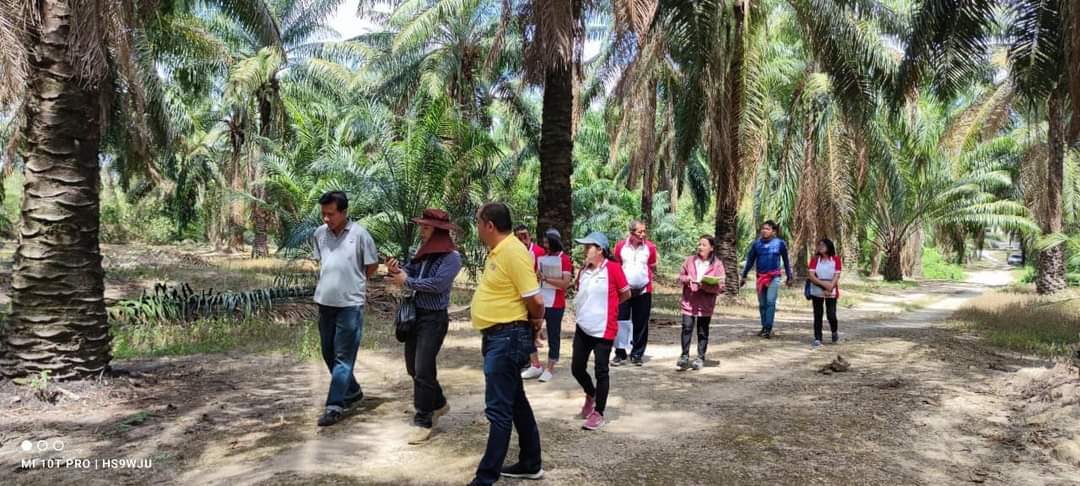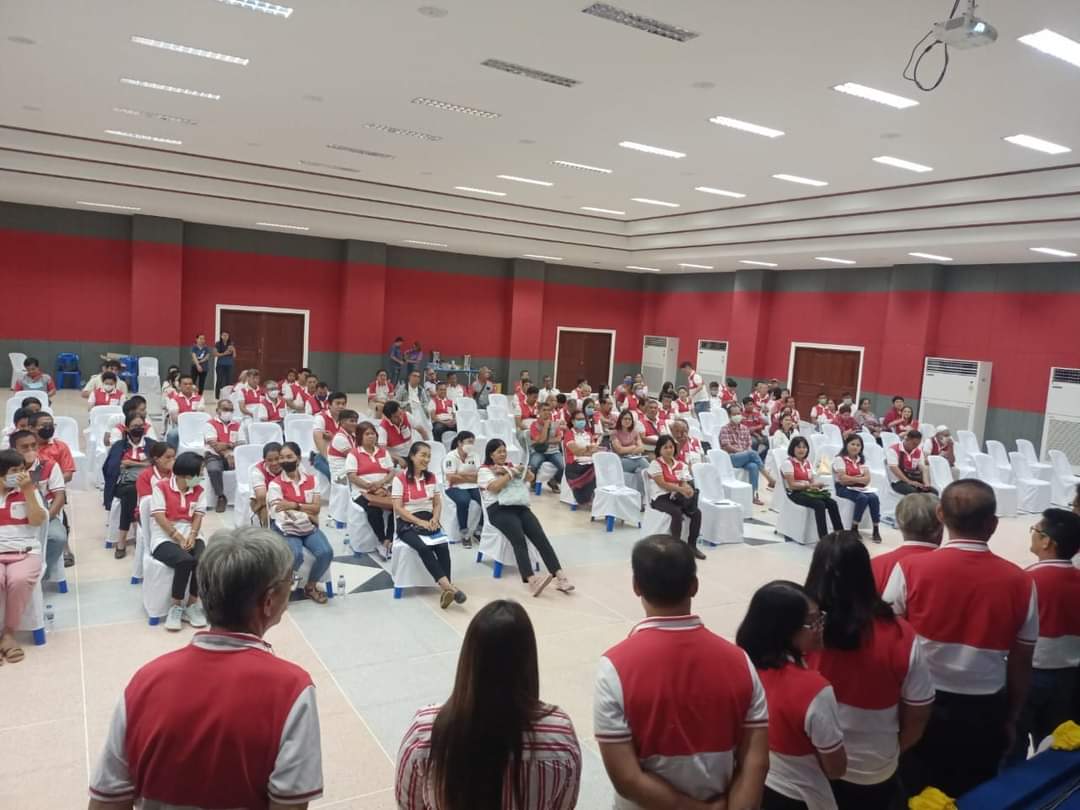
About the group
Number of smallholders: 186 (112 Men, 74 Women)
Total Land Area: 1149 Ha
Status: Certified
Group location: 99/9 Moo 2, Kalasae Sub-district, Sikao District, Trang Province 92150
Country: Thailand
On-going Facilitator: Lam Soon (Thailand) Public Company Limited
SUSTAINABILITY JOURNEY STORY
“Palm oil plantations, passed down from generation to generation, have been an agricultural community way of life for more than 30 years. When the RSPO Standards were implemented, there was a more systematic approach that completes all aspects of palm oil production, including social impacts, environmental security and family economics.”
Apichart Soponmongkolkul
Community enterprise growers palm oil and palm oil sustainability Sikao – Wangwiset
…………..
Apichart Sophonmongkolkul, Manager of Community enterprise growers palm oil and palm oil sustainability Sikao – Wangwiset provided insight into the working habits of area farmers before the sustainable palm oil group was established. “Previously, farmers cultivated only their own farms. There were small groups of farmers but no genuine integration. This hindered us from being able to organise a defined target group when the government came into the area to provide support.”
Apichart continued, “The primary incentive for developing sustainable palm oil practices is to produce premium quality palm oil that will earn higher profits while having greater bargaining leverage. Once the group is formed, group trainings are conducted to improve farm management knowledge and increase access to government assistance.
“Creating a group generates benefits. One benefit is increased price bargaining power, where farmers in the group can sell oil palm products at higher prices than regular farmers. Additionally, by-products from the process can be used for farm improvement. Standardised trainings lead to more consistent production. When the group is better known, it will be easier to collaborate with various agencies. Finally, using RSPO Standards for income and record keeping of costs will lead to improved business management.”
When asked about the positive impacts of sustainable palm oil plantation initiatives by Community enterprise growers palm oil and palm oil sustainability Sikao – Wangwiset, Apichart said, “Palm oil plantations, passed down from generation to generation, have been an agricultural community way of life for more than 30 years. When the RSPO Standards were implemented, there was a more systematic approach that completes all aspects of palm oil production, including social impacts, environmental security and family economics. There is greater awareness of quality palm plantation practices and improved farm management procedures. Standardised farm management practices such as fertilisation application, soil sample collection and worker guidelines provide a more methodical approach to farm management.”
Apichart added, “After being certified by RSPO, there are economic impacts on the surrounding community as well. Group member farmers can sell palm oil at a higher price, usually about 15 satang per kilogram (kg) more than the market price announced by the factory.
“In terms of social impacts, farmers’ employment practices are becoming more systematic, and they have workplace considerations since RSPO Standards address labour issues. There will be no child labour. The standards are very strict with this regulation.
“Furthermore, work practices are becoming more standardised. For example, the use of herbicides and pesticides is reduced as members recognise the adverse effects. Some quit using most chemicals while others use a limited amount and opt instead for alternate approaches that may be more expensive but yield greater results.
“Overgrown grass is a concern on the palm farm. Herbicides cost THB 250 per rai whereas using a lawn mower costs THB 400 per rai. However, when the group explains the benefits of using a lawn mower, such as using clippings as natural fertiliser, members begin to see the long-term rationale. Pesticides have a harmful impact on soil conditions. Farmers should compare positive and negative results. Members now have a better understanding,” Apichart explained.
Asked if the Community enterprise growers palm oil and palm oil sustainability Sikao – Wangwiset has alliances and support from outside agencies or the extraction mill, Apichart stated, “The group receives financial support for inspection fees from the extraction mill, as well as funds from Lam Soon (Thailand) Public Company Limited for certification and membership renewal fees. They also provide a location to set up the group in the same area as the company’s factory. The company assigns a group manager and one employee to help with documentation.”
Addressing the question of whether the Group uses RSPO tools such as the High Conservation Value (HCV) application, Apichart stated, “There was a training on its use. However, due to a lack of familiarity with this tool, the usage among members is only 30%. Language remains a significant obstacle because the application uses English.”
Speaking to the challenges of moving toward sustainable palm plantation organisation, Apichart stated, “The RSPO Standards are the source of most problems. The higher and more restrictive the standard, the less able farmers are to meet even half of them. Personally speaking, in order for RSPO to be widely accepted, it should be less strict.
“The stronger the certification standards, the better the profits for farmers. However, if the criteria are too stringent, it is difficult to persuade growers to get certified and produce quality palm. The standards should be made easier to promote sustainable palm plantation practices. As standards become more rigorous, farmers do not find it easy to comply. It is becoming more difficult by the year,” Apichart explained.
Regarding the next year’s goals and five-year plan for sustainable palm production, the Manager of Community enterprise growers palm oil and palm oil sustainability Sikao – Wangwiset revealed, “Membership has grown every year. There have now been four batches of farmers. The goal is to expand membership. The group will have greater value and the ability to negotiate better with the factory and our other partners. Every year, more members are certified. But when RSPO announces new guidelines, it causes a delay in adding members because accepting members requires greater scrutiny.
“Furthermore, the group set targets of increasing productivity while maintaining quality. For example, farmers who previously produced 3.1 tons per rai have increased to 3.2–3.4 tons. Farmer production of palm oil per rai per year is increasing, so 3.6 tons per rai per year is currently a certified plot goal.”
According to Apichart, “The most significant change following the transition to sustainable palm plantation is more systematic management practices. This leads to sustainable palm planting. It is vital to understand when and how to grow, as well as how to profit. Maintaining farm records is the most significant element as it helps farmers manage their palm plantations.
Asked what is key to ensuring that smallholder groups continue to be certified long-term, Apichart admitted, “Creating a group and carrying out group activities for smallholders is tough. The group has gotten assistance from mills, government agencies and farmers themselves. These three groups must collaborate. Smallholders would be unable to continue if either the group of smallholders or management stopped.
“Future challenges with RSPO Certification include maintaining the standard and increasing membership as RSPO becomes more rigorous. Furthermore, although there are over 20 farmer groups, the overall group still struggles with a lack of inspectors. More inspectors are needed,” Apichart concluded.
Project Impact
Total area covered by the project
1149 Ha
Number of smallholders benefitting from this project
186 Smallholders
Number/percentage of women supported by this project
39.78% women in this project
How you can support
If there are people interested in supporting the group, they can do so in the following ways:
- Supporting educational field visits that are beneficial for establishing and managing palm oil plantation standards.
- Providing training on standards to enhance the group’s knowledge and understanding.
- Providing funding to support the expansion of membership and certification processes.
GROUP CONTACT
Representative Contact
Chairit Thiyuan | President | [email protected] |
Apichart Soponmongkolkul
Group Manager
(+66) 89 892 9511
[email protected]
IMAGE GALLERY

Community enterprise growers palm oil and palm oil sustainability Sikao - Wangwiset

Community enterprise growers palm oil and palm oil sustainability Sikao - Wangwiset

Community enterprise growers palm oil and palm oil sustainability Sikao - Wangwiset

Community enterprise growers palm oil and palm oil sustainability Sikao - Wangwiset

Community enterprise growers palm oil and palm oil sustainability Sikao - Wangwiset

Community enterprise growers palm oil and palm oil sustainability Sikao - Wangwiset




